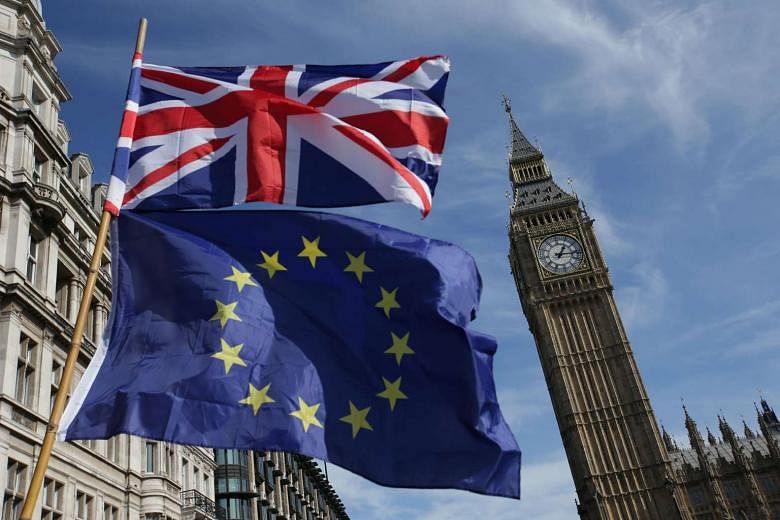Business people and diplomats are familiar with the cliche that negotiations are best conducted on a "win-win" basis. But the Brexit talks are different. The negotiators on both sides are looking for a lose-lose deal. They know that if the talks are to succeed, the United Kingdom and the European Union must be satisfied with the level of pain they are inflicting on each other.
The starting point is that the British are already inflicting losses on the EU through the very act of leaving. As a result, EU citizens will lose the automatic right to move to Britain, the EU will lose legal jurisdiction in Britain and it will lose a substantial contributor to its budget. The EU will also lose face. And, if things really go wrong, the EU could lose its very existence, as other nations follow Britain out of the door.
Faced with all these losses, actual and potential, the EU is determined that Britain must suffer more than the organisation it is leaving.
This is seen as a matter of justice and of survival. If Britain does not suffer visibly from leaving the EU, why should other countries stay? And why should Britain be allowed to keep all the benefits of EU membership while sloughing off the costs and responsibilities?
Behind the scenes, the British government has tacitly accepted this lose-lose logic. That was the significance of the recent statement by British Chancellor Philip Hammond that Britain cannot "have its cake and eat it". For the British government, therefore, the negotiations will centre on limiting the price that the country pays for Brexit.
But in seeking to craft an acceptable "lose-lose" deal, the British side faces four big problems. First, the British public has not been prepared for the idea that there might be a substantial cost associated with leaving the EU. Second, this is not a negotiation between equals: Britain is far more dependent on trade with the EU than the other way around.
Third, the structure of the negotiations favours the EU. If there is no deal reached after two years, then Britain will leave without one, facing tariffs and red tape as it seeks to export to its largest single market.
Finally, there are hardliners on both sides who would relish a "train-crash Brexit" in which Britain leaves without a trade or transition deal in place. In Brussels and elsewhere, there are plenty of people who would enjoy the sight of investors pulling out of Britain - and of lorries stacking up outside the port of Dover, as they struggle with new Customs regulations.
In Britain, meanwhile, there are hardliners who insist that it has nothing to fear from leaving without a deal. They will scream betrayal at any concessions Britain makes in the talks. Even Prime Minister Theresa May has said that "no deal is better than a bad deal".
Despite this brave rhetoric, there is evidence that the British government is coming to understand the dangers of a train-crash Brexit. The day after Mrs May gave the EU formal notification of Britain's intention to leave, her most senior ministers, Mr Hammond and Foreign Secretary Boris Johnson, travelled to Germany to woo the country's elite.
I was sitting in the audience at the annual Anglo-German Konigswinter conference as the two ministers attempted to charm their German audience. The reception they received was polite, even warm at times. But the composition of the audience was perhaps more significant than its reaction. The conference was just outside Berlin. But the Germans had not sent ministers of comparable seniority. The message was clear. The British now need the Germans much more than the Germans need the Brits.
The top German priority is maintaining the unity of the remaining 27 EU nations. That means that demands made by Slovakia or Spain will automatically be given a higher priority than the needs of a British government that is on its way out. An early sign of how that process will work came with the inclusion of the status of Gibraltar, a Spanish obsession, as part of the EU's negotiating guidelines for Brexit.
The German government's gaze is shifting towards the shape of the EU after Britain has left. In many ways the Germans do not like what they see. One troubling question is that of who will fill the hole in the EU's budget left by the loss of Britain, the second-largest net contributor? The Merkel government is concerned that Berlin will be expected to pick up the bill.
This money worry offers a small window of opportunity for the British in the Brexit negotiations. Britain could offer a financially generous divorce settlement to gain goodwill. The overall deal - in crude terms - would be money for market access.
Pulling off such a deal will be a formidable technical and political challenge. Beyond the technicalities lies an even bigger psychological issue. The British and the EU somehow need to rediscover the idea that they can work together in their mutual interest. The problem with the current lose-lose logic is that it inevitably leads to bitterness - and then to escalation.
The phrase "win-win" may be a miserable cliche. But it is a better way to look at the world.
FINANCIAL TIMES

